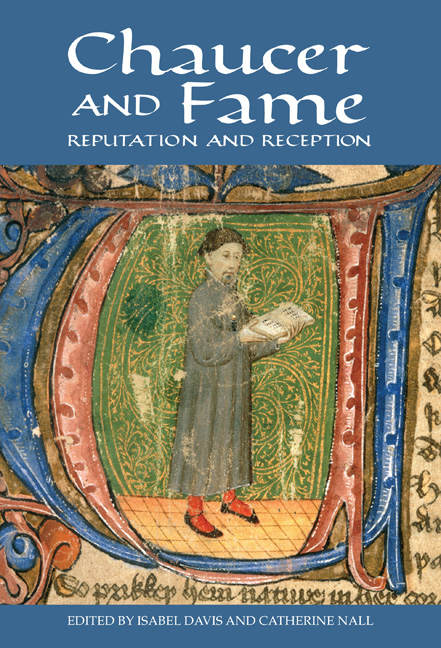Book contents
- Frontmatter
- Contents
- List of Illustrations
- List of Contributors
- Acknowledgements
- Introduction
- 1 Chaucer Joins the Schiera: The House of Fame, Italy and the Determination of Posterity
- 2 ‘I Wolde … han Hadde a Fame’: Dante, Fame and Infamy in Chaucer’s House of Fame
- 3 ‘And kis the Steppes where as thow Seest Pace’: Reconstructing the Spectral Canon in Statius and Chaucer
- 4 ‘I Nolde Sette at al that Noys a Grote’: Repudiating Infamy in Troilus and Criseyde and The House of Fame
- 5 The Early Reception of Chaucer’s The House of Fame
- 6 Fame’s Penitent: Deconstructive Chaucer Among the Lancastrians
- 7 After Deschamps: Chaucer’s French Fame
- 8 ‘Fresch Anamalit Termes’: The Contradictory Celebrity of Chaucer’s Aureation
- 9 Chaucer the Puritan
- 10 Revenant Chaucer: Early Modern Celebrity
- 11 Ancient Chaucer: Temporalities of Fame
- Bibliography
- Index
- Chaucer Studies
11 - Ancient Chaucer: Temporalities of Fame
Published online by Cambridge University Press: 21 May 2021
- Frontmatter
- Contents
- List of Illustrations
- List of Contributors
- Acknowledgements
- Introduction
- 1 Chaucer Joins the Schiera: The House of Fame, Italy and the Determination of Posterity
- 2 ‘I Wolde … han Hadde a Fame’: Dante, Fame and Infamy in Chaucer’s House of Fame
- 3 ‘And kis the Steppes where as thow Seest Pace’: Reconstructing the Spectral Canon in Statius and Chaucer
- 4 ‘I Nolde Sette at al that Noys a Grote’: Repudiating Infamy in Troilus and Criseyde and The House of Fame
- 5 The Early Reception of Chaucer’s The House of Fame
- 6 Fame’s Penitent: Deconstructive Chaucer Among the Lancastrians
- 7 After Deschamps: Chaucer’s French Fame
- 8 ‘Fresch Anamalit Termes’: The Contradictory Celebrity of Chaucer’s Aureation
- 9 Chaucer the Puritan
- 10 Revenant Chaucer: Early Modern Celebrity
- 11 Ancient Chaucer: Temporalities of Fame
- Bibliography
- Index
- Chaucer Studies
Summary
‘Alle thyng hath tyme’ – pliant wisdom, derived from the Book of Ecclesiastes (3:1), that is wielded in Chaucer's poetry by everyone from an opportunistic fiend to an irreverent merchant to an overzealous go-between. Like these characters, Chaucer as poet contemplates the power of time and appropriates it for his own ends. The present essay is concerned with the makings of Chaucerian time: namely, time as a shaping force of authorship and a conduit of reception. It explores Chaucer's engagement with the poetic past – ‘olde tyme’ – and his own assimilation into a new poetic past after his lifetime, proposing that these pasts creatively intersect. More specifically, it considers one strand of Chaucer's early modern reception that in turn illuminates the poet's own attention to his incipient celebrity as an English author: the hermeneutic of antiquity. The reciprocal status of antiquity and celebrity, I argue, suggestively informs the early reception of Chaucer, his construction (and self-construction) as a vernacular author, and his own poetic figuration of authorial renown in relation to the passage of time.
By the second half of the sixteenth century, Chaucer and his language were regarded as ‘ancient’, a word attached prominently to the poet in the title of Thomas Speght's monumental Renaissance editions of The Workes of Our Antient and Learned English Poet, Geffrey Chaucer (1598, 1602; ‘Ancient, Learned, &Excellent’ in 1687). Scholars have emphasized the commercial and nationalist motivations behind the early modern alignment of Chaucer with the luminaries of classical tradition, the proclamation of Chaucer's auctoritas as progenitor of English poetry, and the effects of these trends in learned mediation of Chaucer's now-distant (and, through apocryphal accretions, much-expanded) works. The complexity of the ‘ancient Chaucer’ tradition has not fully been confronted, however, and the following pages pursue several suggestive paradoxes informing early modern efforts to render Chaucer both classical and vernacular, ancient and childlike, old and new.
Turning, thereafter, from reception history – biographical and editorial fashionings of Chaucer and remarks on Chaucer's antiquity by his early admirers and critics – to Chaucer's own self-reckoning as a poet contending with an ancient legacy and a myth of poetic fame, the last two sections build on newer methodologies associated with ‘career criticism’ and intertextuality to reveal how a reciprocity of antiquity and celebrity is inscribed in Chaucer's poetry itself.
- Type
- Chapter
- Information
- Chaucer and FameReputation and Reception, pp. 201 - 220Publisher: Boydell & BrewerPrint publication year: 2015
- 1
- Cited by

